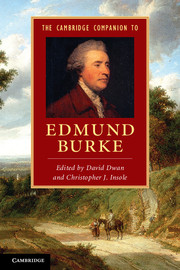Book contents
- Frontmatter
- Contents
- Contributors
- Acknowledgements
- Method of Citation
- Chronology
- Introduction Philosophy in Action
- 1 Burke’s Life
- 2 Burke, Enlightenment and Romanticism
- 3 Burke as Rhetorician and Orator
- 4 Burke’s Aesthetic Psychology
- 5 Burke on Law and Legal Theory
- 6 Burke on Political Economy
- 7 Burke and Religion
- 8 Burke and the Constitution
- 9 Burke and the Natural Law
- 10 Burke and Utility
- 11 Burke and the Ends of Empire
- 12 Burke and the American Crisis
- 13 Burke on India
- 14 Burke and Ireland
- 15 Reflections on the Revolution in France
- 16 Burke’s Counter-Revolutionary Writings
- 17 Burke in the United States
- Further Reading
- Index
- References
9 - Burke and the Natural Law
Published online by Cambridge University Press: 05 December 2012
- Frontmatter
- Contents
- Contributors
- Acknowledgements
- Method of Citation
- Chronology
- Introduction Philosophy in Action
- 1 Burke’s Life
- 2 Burke, Enlightenment and Romanticism
- 3 Burke as Rhetorician and Orator
- 4 Burke’s Aesthetic Psychology
- 5 Burke on Law and Legal Theory
- 6 Burke on Political Economy
- 7 Burke and Religion
- 8 Burke and the Constitution
- 9 Burke and the Natural Law
- 10 Burke and Utility
- 11 Burke and the Ends of Empire
- 12 Burke and the American Crisis
- 13 Burke on India
- 14 Burke and Ireland
- 15 Reflections on the Revolution in France
- 16 Burke’s Counter-Revolutionary Writings
- 17 Burke in the United States
- Further Reading
- Index
- References
Summary
When Burke attends to wrongs committed by the state, as he does in relation to British actions in Ireland and India, he reaches for the notion of an ‘immutable, pre-existent law’ (WS, VI: 350) that cannot be trumped by positive laws or human authority. Similarly, when facing down the philosophical zeal of the French revolutionaries, he makes appeal to a normative conception of nature that he claims the philosophes violate. Burke’s resort to natural law language is neither frequent nor systematic. Nonetheless, a treatment of the theme is warranted, because of the dramatic role such references play in what Burke considers to be extreme situations of state-sanctioned injustice or immanent European chaos.
Recent commentators on Burke can be forgiven for giving this topic a fairly wide berth. More heat than light has emerged from recent exchanges about the importance or otherwise of natural law thought in Burke’s writings. Tribal loyalty or hostility to ‘natural law’ or ‘Thomist’ readings of Burke can take the place of more nuanced and differentiated evaluations. More recently, the terms of the older debate as to whether Burke is a ‘natural law’ or ‘utilitarian’ thinker, tend to be seen as redundant, with a consensus that the complexity of Burke’s work is not unlocked but distorted by using the lens of a single philosophical system, whether that be utilitarian or Thomist. Rather, the task for Burke scholars is more commonly conceived to be that of tracing a large number of diverse discourses and influences, with a tendency to emphasise the lack of any systematic theory in Burke.
- Type
- Chapter
- Information
- The Cambridge Companion to Edmund Burke , pp. 117 - 130Publisher: Cambridge University PressPrint publication year: 2012
References
- 7
- Cited by

